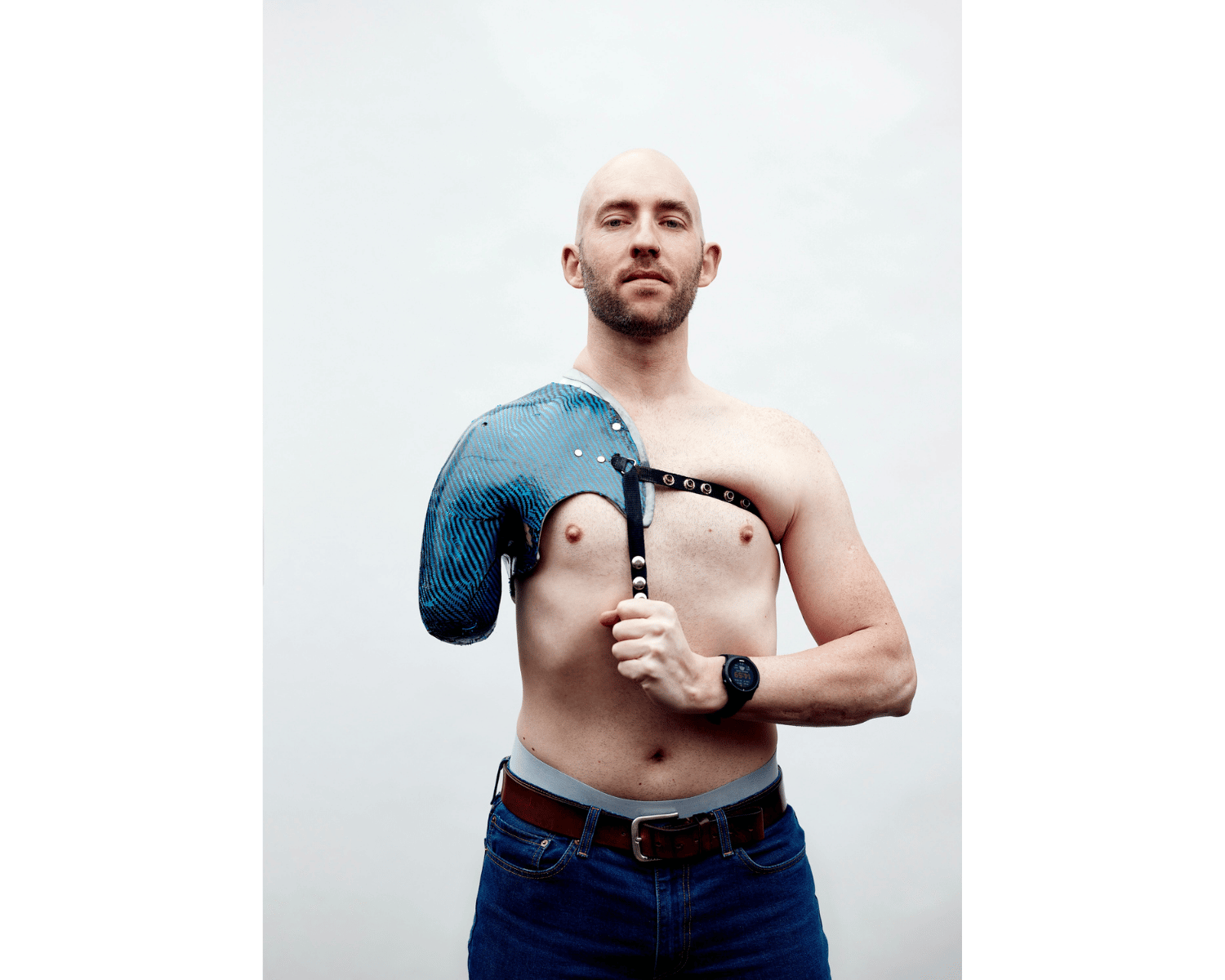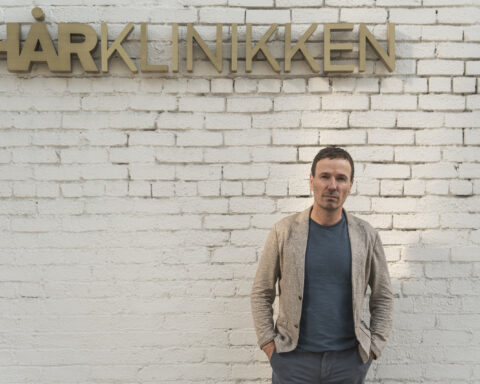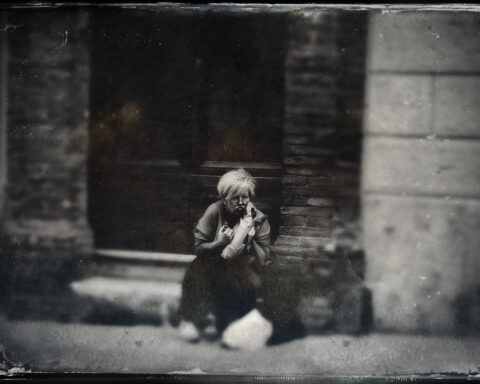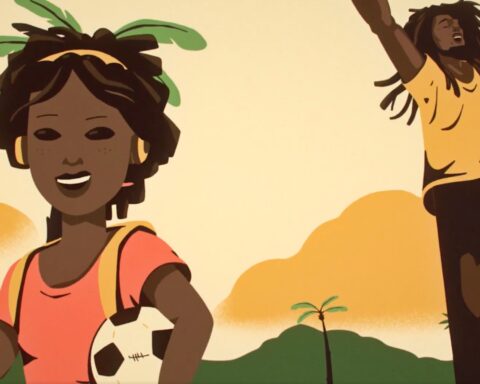I was brought up in a military family, and I knew from the age of eight that I wanted to join the army and be like my dad. I would watch him go off to his barracks every morning in his uniform, and witness the camaraderie and sense of belonging he had with his military friends, and I knew that was what I wanted too. Looking back now, that gave me a lot of drive and direction in my early years, as I knew what I was aiming for.
So at 17 I joined the army, and began my three months of basic training. It was the first time I’d ever been away from home for more than a weekend, and it was a massive culture shock and you’re forced to grow up pretty quickly. Then in June 2003, I passed out in front of my family and went to join the King’s Troop, Royal Horse Artillery, a mounted ceremonial regiment that rides in all the parades in London. I knew nothing about horses, but my dad told me that if I was going to join the army, I had to learn a trade. So I did some research on the various trades that were available, and decided I wanted to train to be a farrier, who specialize in making shoes for horses, and can make a good living for themselves, running their own business. But before I focused on becoming a farrier, there were some more boxes I wanted to tick. I wanted to do some adventurous training, and go on an operational tour. So in 2007, I volunteered to go to Afghanistan, and spent seven months there recruiting people to be interpreters for the British armed forces. Then shortly after returning from Afghanistan, I went trekking in the Himalayas for my adventurous training. So with those targets achieved, I was ready to start working in the forge, and training to become a farrier.

Then on May 31, 2009, I was riding my motorbike back to the barracks when I crashed into the central reservation. I don’t know what happened, but I woke up four days later at the Royal London Hospital, Whitechapel, a right arm and a shoulder lighter, with two broken ankles, while my left arm was smashed to pieces and was being held together by external fixators. The doctor came in and gave me the good news, “Mr Richards, you’re very lucky to be alive. You’ve been involved in a motorcycle accident…” Then he started listing my injuries, broken ankles and so on, and said, “Unfortunately, after six-and-a-half hours of surgery, we were unable to save your right arm and shoulder.” I remember looking over and seeing a pillow where my arm should have been. I looked around the room, my parents and some other members of the regiment were there, and everyone was very upset and somber. I took it all in, and then said to the nurse, “Is the plumbing still attached and working?” They said that’s all fine. So I said, “Well nothing else really matters, does it?” Very quickly, I accepted my situation for what it was, that I was going to have one arm for the rest of my life, and that there are people worse off than me. I’ve always been a person that doesn’t concern myself with things I can’t control. My arm and my shoulder are not going to grow back. I can’t control the fact they’re gone. But what I can decide is how I adapt to it.

I was in hospital for two months, then I was taken to the Defence Medical Rehabilitation Centre, which was in Leatherhead, Surrey, at that time. I spent six months in rehab, and I couldn’t walk for four of those six months because of my broken ankles. Then I started walking with a stick, but my legs couldn’t support me for very long. I was offered medical discharge from the army, but I thought, ‘This is what I’ve wanted to do since being an eight-year-old boy, I’m not going to let one bad day ruin it for me.’ I stayed in the military for a further three years, but I didn’t want to just collect dust, so I started working on my fitness, doing what I could. Although I couldn’t do press ups or pull ups anymore, I could do sit ups, and I could still run. I trained myself to run a mile and a half in under nine-and-a-half minutes, I learned to ride a horse again, and I learned to rock climb. I remember being halfway up a rockface in Spain, where I was on a climbing trip, and thinking, ‘If I’ve adapted to this new way of life as seamlessly as I have, I have nothing to worry about.’ But then, just a short while after that, in March 2012, the military were going through cutbacks and I was a non-deployable soldier, so I was told that I’d be medically discharged. I was 27 and had spent the last ten years in the army. Looking back at it, I had my entire identity, and any self-worth I had, taken away from me.

I went back to my family home in Somerset, in the south west of England, in September of that year, and that’s when my life took a downhill turn. When I look back at the first year out of the army, it was the worst year of my life, worse than losing my arm. I began applying for jobs, and that year I submitted 327 job applications, of which not one led to anything. I was living on my savings, which was supposed to be a deposit on a house. And I remember the day well, in August 2013, when I had to tax and reinsure my car and my card was declined, so I checked my account and I had 15p to my name. Running parallel to that, I was becoming a recluse and getting quite depressed. The thing is when you’re depressed, you don’t know you’re depressed, although everyone else can see it. That afternoon, when my mum and dad were at work, I saw a reflection of myself in the bathroom mirror. I was unkempt, overweight, drained of all my color. I just thought, ‘What have I really got to look forward to? Because if this is what life has got in store for me, after everything I’ve been through, always with a smile on my face, I have nothing left to give.” I tried to hang myself, but I got halfway through doing it, when this thought came over me, “What’s my mum going to do when she finds me.” So I stopped.

That was my rock bottom. And the thing about rock bottom is that everything can suddenly seem so clear. I knew I needed to make some changes. So I set myself a goal that I needed to get back to London. The following month, I managed to get a job as a chauffeur after the Help for Heroes charity put me in touch with a company called Capstar, who had a policy of employing veterans, with a percentage of the workforce consisting of people who had been medically discharged. I was working in London, and living in a caravan in this little village outside of Windsor. The caravan was a proper shitbox, the roof leaked, I couldn’t afford to keep it warm in the winter. I was living on custard cream biscuits, because they were only 25p a pack. I would work seven days a week because the car was the only place I had to keep warm. Although when I turned up for work, you would never know I was living the way I was. My shirt was always ironed, my shoes were always shining. I’m driving all these rich, successful, and famous people, and my life is the polar opposite. And then I decided I would use this opportunity to learn from the people I had in my car. So I started studying what these people were doing that was making them successful, and what they were doing in the car when nobody else was looking, because that’s when it matters most. I was in the perfect position to see their schedule, and cherry pick inspiration from their lives. For example, I had this one client who I would drive to the gym on the way to their office at 5.30am, so I started exercising before work too. And it was amazing how much more alert and awake I’d be starting the day. Primarily, I learned from these people that I should make the most of my time that I had available. And if I was offered an opportunity, whatever it was, I should say, “Yes.”

In 2015, an opportunity came along to become part of a four-man crew to row across the Atlantic. There were 28 of us competing for these four spots. So I threw myself into learning to row, with one arm of course, and I ended up getting to the final five, but not being one of the four that were selected. Being unsuccessful in that was my greatest achievement, because I got to learn so much about myself and what I was capable of, despite my limitations, and what other people may say or think. It was an important life lesson, that there’s more to success than winning. You learn more from your failures than anything. Saying that, that doesn’t mean you should enter a challenge half-heartedly, because it’s your time you’re wasting. As long as you try your best, you can hold your head high.
As soon as I got that phone call to say I hadn’t been selected for the row, I knew I needed to find something else to focus on. I had a bicycle at the time, so I threw myself into that. I started working towards competing in the Invictus Games in 2018. I didn’t have all the fancy kit, I just had a cheap bike and watched YouTube videos to learn some training plans. I started putting pictures of my progress on Instagram, and on the back of that I was approached by a modeling agency who represent people with disabilities. From that, I became the face of a high street bank, and spent a month in Greece filming a reality TV series for Channel 4 called ‘Naked Beach’. And when the Invictus Games came round I was selected for the UK cycling team, and in October 2018 I went off to Sydney, Australia, and represented my country. I didn’t win any medals, but it wasn’t about that, it was about showing what I could achieve if I applied myself.

Taking part in the games was a line in the sand for me, that there was more to me than someone who was once in the military. I got a lot from the military, but that chapter of my life was over. Over the years I’ve been lucky enough to have been offered the opportunity to learn to ski and scuba dive too, and I jumped at both of those. My next challenge is to take part in the Race Across America, a 3,000-mile cycle from California to Maryland in June this year. And next year, I am marrying my fiancé, Zee. We met in 2019 when I was giving a talk on resilience in London, and she was in the audience. We are getting married on May 31, the same day I lost my arm. I chose the date because it signifies that life goes on, and disability is not a final destination. The accident should have killed me, so I have kept the helmet I was wearing when I crashed, as a reminder of the second chance of life I’ve had. Eoin Walker, one of the paramedics that day, is one of my best men at the wedding.
I used to wear a prosthetic arm. It was a cool-looking thing, that made me look like the Terminator. But it served no purpose at all, and I found I used to hide behind it. So I decided one day I wasn’t going to wear it anymore. I am what I am, a man with one arm. My problems are no bigger or better than anyone else’s. Everyone’s got their issues. I’d take my one arm over a cognitive issue, like PTSD. Anyone who deals with things you can’t see, I think they’re the braver ones.

Keep up with Dan’s adventures on his Instagram.











